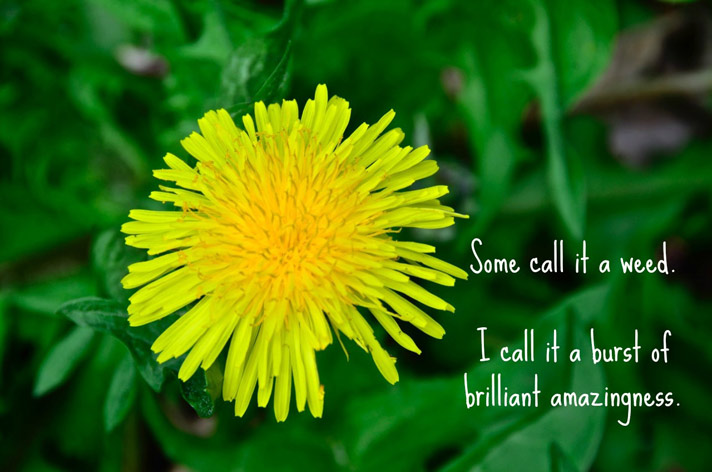Love Thy Pollineighbor – April 2017
We pull them, mow them, dig them, stomp them, spray them, shout at them, and lament how they are a nuisance in our lives.
Dandelions.
An underappreciated and underutilized plant in our society, the dandelion in the Asteraceae (aster or sunflower) family, is one of the most nutrient-packed foods on earth and one of the world’s most widely used herbal medicines.
According to Amy Fontenot, a traditional living skills teacher and beekeeper, dandelions have a noteworthy history. They were intentionally brought over on the Mayflower as a source of food and for their medicinal properties. The scientific name for dandelion, Taraxacum officinale, means “the official remedy for disorders.”
Countless sources including the book, Botany in a Day, emphasize how dandelion leaves and roots, which are rich in vitamins A, B, C, and E, and minerals iron, phosphorus, potassium, copper and calcium, offer dozens of health benefits.
Here are 10 ways dandelions, a free and effortless nutrition and energy source, can improve your life.
- Dandelions for digestion. Eat a few dandelion leaves before a meal to aid in digestion. Dandelion root has mild laxative qualities, and it promotes healthy bacterial function in the digestive tract. Dandelion roots contain probiotics, which are good for your gut bacteria and bolstering your immune system.
- Dandelion juice or tea is a detoxifier healing liver disorders, diabetes, and urinary disorders. Lower blood sugar? Dandelion juice does that too.
- The leaves have diuretic properties. They also contain significant amounts of potassium, which is often depleted as a result of pharmaceutical diuretics.
- Soothe inflammation and dissolve kidney stones without an invasive procedure? Yep. Dandelion root can do that.
- The sap, called latex, from the stem and root can remove warts. Dandelion latex has anti-aging properties reducing the appearance of age spots and wrinkles while firming the skin. It also soothes itches, rashes and other skin irritations. Test a small spot for an allergic reaction first.
- Dandelion leaves are rich in calcium and high in Luteolin and vitamin C, which are all great for bone health.
- Those same antioxidants, vitamin-C and Luteolin, reduce free radicals (cancer-causing agents) in the body, thus reducing the risk of cancer.
- Dandelions are high in iron and help reduce the risk of anemia.
- Dandelions’ persistent and deep taproots help to break up soil while drawing vitamins and nutrients closer to the soil surface. A natural fertilizer!
- Bee food!
In early spring dandelions are often the first source of sustenance for native bees. The blue orchard mason bees grace us with their gentle presence as day temperatures reach a steady 55 degrees. They emerge from cocoons out of dead wood, reeds, and trees after a 10-month overwintering period. They are hungry.
Native bees pollinate more efficiently than honey bees. According to Marsha Waite, Master Gardener and hobby entomologist, they are the first to pollinate early blooming fruit trees, shrubs, and flowers, and it takes 545 honey bees to do the work of 7 mason bees. This, in part, because mason bees, unlike honey bees, are early risers, late workers, and will stay busy in the rain. They accomplish a lot in their short-lived adult lives lasting only 5-6 weeks.
Like honey bees, our natives are disappearing due to pesticides, habitat loss, and climate change. By leaving an area of (unsprayed) dandelions this spring and then mowing or pulling before they go to seed, you can help feed and protect our declining native bee population. And you can make a healthy salad!
This spring, harvest some of the health benefits of dandelions for you and your pollineighbors.
On February 21, City Council decided, much to my dismay, to table Jacksonville’s Bee City initiative for six months. Despite this setback, there is a small albeit growing group of pollinactivists here in Jacksonville who believe in our town’s potential to be a steward for pollinators. If that resonates with you, let’s chat! Email me at kendaswartzpepper@gmail.com.
The above health-related information is not intended to be a substitute for professional medical advice, diagnosis, or treatment, and no physician-patient relationship is, or is intended to be, created.

 When she’s not working, volunteering, fiddling about the garden, photographing nature, being a pollinactivist, blogging about social and environmental justice, or pawning her eco-children’s book, Kenda, a former Monarch butterfly docent, gets her kicks hanging with her husband, her dog, and the pollineighbors.
When she’s not working, volunteering, fiddling about the garden, photographing nature, being a pollinactivist, blogging about social and environmental justice, or pawning her eco-children’s book, Kenda, a former Monarch butterfly docent, gets her kicks hanging with her husband, her dog, and the pollineighbors.